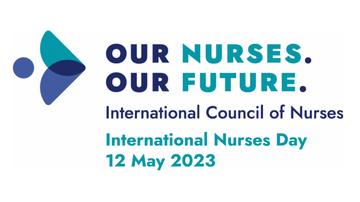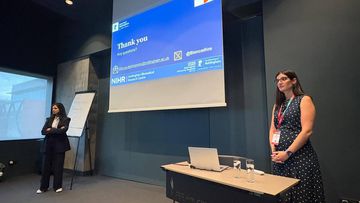Specialist nursing in the MDT : making best use of skillsets
News
Today is International Nurses Day. This year's campaign is: Our Nurses. Our Future. The focus is on learning from the past and translating this into positive actions for the future.
We are so aware of the challenges in the NHS at present and of particularly those facing our nursing staff. There have been some staggering findings shared around rates of burnout, sick leave and mental difficulties amongst our nursing workforce*. There have also been heartfelt requests from nurses via the Royal College of Nursing to the government where resource and workforce pressures are affecting their ability to do their jobs safely and with compassion.
There is a real need to maximise collaborative and multidisciplinary working to optimise support to patients and across the workforce, and many areas are doing this. By recognising the particular skillsets and strengths of each role, and matching them to responsibilities within a patient population, pressures on individual staff can be alleviated, professionals can feel valued for their contribution, and patients receive the best possible support. How do we do this in practice, though?
Neurology Academy spoke to MS specialist nurse Sarah Roderick to understand her team's award winning solution to this challenge. Working in the historic county of Huntingdonshire as part of Cambridgeshire and Peterborough NHS Foundation Trust, she explained how identifying and maximising different team member's skillsets combined with an agreed structure that everyone supports has meant the whole service can work optimally and patients get the best possible care.
'I think we need to look at the people in our team - even if there's just two of us! If we bring an awareness of own skillsets and values, and use that to bring the best possible support to our patients - we don't want to put people in silos or assume everyone brings the same skillset.'
In Sarah's team, this way of thinking has been put into a clear structure where patients are stratified according to their needs and using agreed criteria, with the understanding that this stratification is flexible and patients will move in and out of different groups - something which is clearly mapped into the structure (e.g. in the 'diagnosis phase', there is a clear note to move that individual to their new phase - likely that of relapse / disease-modifying treatment' - after the first year).
Within each needs group, Sarah's team have an agreed working practice, including assessment types, teams or pathways to feed into as needed, measurable elements including timeframes, and a range of topics to broach with the patient which across clinical and wellness spheres and span physical, cognitive, emotional, relational and spiritual domains.
'Different people are good at different things - we cover employment, pain, relationships and family support, bladder issues, pregnancy and advance care planning - it's a really wide range of discussions, and it brings different information and education requirements. It blends clinical experience and softer skills - I think that's where nurses really bring something brilliant.'
Sarah explains the broader benefits to her service and those with MS and their families who she supports:
'There are lots of benefits to our system - it streamlines the service, ensures consistency and equity of provision, and means we can all feed in where we are strongest.
It also means the service format isn't reliant on a role or an individual. It's part of the commissioned service, our managers have access to it, it sets out the links with primary care and pharmacy and it's there for any role to come into - which means any changes in staffing won't impact the quality of style of care that our patients are used to.'
Sarah also talks about the importance of seeing a whole person, and knowing when to support someone directly or refer them into other services as needed. Vocational support when someone is experiencing cognitive decline is one example of this.
'If someone's struggling with work, we'll explain that it's important to look at reasonable adjustments rather than reducing their hours - and we can support them with this alongside our OT colleagues if needed.
We can advocate on their behalf, or we can link into things like vocational occupational therapy, cognitive services, we can look at their medication to make sure that's not affecting their cognition, we can ask about home life and how that's impacting work - we can see the whole picture.'
Ruth Stross, head of nursing at Neurology Academy highlights how Sarah's system could be instrumental in maximising some of the newer roles in neurology teams.
'The skillset of a specialist practitioner is different to a specialist nurse, though often the two roles are considered interchangeable. They're not interchangeable at all - but they can be really complementary.
A specialist practitioner is often an allied health professional, like a physiotherapist or an occupational therapist, by training, and they bring that whole-person perspective to practical support so people can meet their own goals and live their day to day lives as well as possible.
A specialist nurse will bring a wealth of clinical nursing experience into their specialist post, so is ideally placed to support overlapping health conditions or notice comorbidities in addition to the primary condition they're supporting. They also tend to care for the whole family, and can see when the person's condition is being impacted by something more intangible.'
In Sarah's striated needs system, with its clear criteria and range of assessments and discussions, the background and strengths of a practitioner and a nurse could be divided to maximise resource and ability. For example, perhaps a practitioner could provide supported self-management, pre-emptive health promotion, vocational support and holistic management around personal goals and activities of daily living, whilst a nurse might discuss bladder and sexual dysfunction, cover medicines management, support personal care, mood challenges and advance or future care preferences. Both roles could equally support mobility, balance and function, fatigue and pain management, shared decision-making, education and signposting, and onward referrals.
'Nurses are invaluable - but so is everyone else in the multidisciplinary team. It's all about joint working, valuing each role and what they bring. It's looking at your patient, and bringing in whoever they need to get their needs met.'
Sarah's system is unique to her service which comprises herself and fellow specialist nurse Ellie Garlick, and was presented with the Judges Special Award at QuDoS in MS Awards this year in well-deserved recognition. They receive referrals from neurologists, GPs, other healthcare professionals and take self-referrals - anyone with MS who is registered to a GP practice in their county has open access.
Sarah and Ellie, who are both also Queen's Nurses, are happy to share their structure outline if it will help others and we are hugely grateful to them for this willingness.
This stratification is used in conjunction with the MS patient pathway throughout and in all phases, 'annual review' or 'assessment' will be comprehensive and include a range of discussion topics spanning physical, emotional, cognitive, vocational and spiritual needs. These are all clearly listed on their documentation with additional notes, red flags, potential referrals, and management notes spanning pharmacological, therapeutic and educational.
Diagnosis phase
Criteria: Patient is newly diagnosed with MS and referred to the service
Nurse attempts to make contact with patient within 7 working days of receiving a referral and offers an appointment with a nurse within 1 month.
Assessments are made if wanted by patients
Early discussions to include lifestyle, mental health, sleep, supplements, skin care, information about infection and relapse, rehabilitation and available support.
Support to the family and education including onward referral for formal education is offered.
Relapse / DMT
Criteria: Patient is experiencing frequent relapse / patient is being treated with a DMT
Offer annual review and ensure patient is aware of support available
Refer to local MDT as needed
Offer support and education around DMT choice and administration
Feed into relapse pathway as appropriate
Maintenance
Criteria: Patient has stable MS and is able to maintain condition well independently or with carer support
Offer annual review and provide contact details for nursing team for access as needed
Assessments are are listed for consideration
Needs of family carers and educational needs of formal carers are checked
Complex
Criteria: Patient is symptomatic or has complex needs
3 monthly remote contact as appropriate
Regular visit depending on need and preference
Annual review and assessment (as in maintenance)
Note-sharing or collaboration across MDT as needed - other members of MDT may lead
Advance care planning discussions to be offered and followed up as appropriate
Palliative
Criteria: Patient has progressive deterioration physically and / or cognitively; speech problems with increased difficulty communicating and / or progressive dysphagia; recurrent aspiration pneumonia or respiratory failure; identified as possible last year of life
Advance care planning offered and put in place as needed (all forms and documentation listed)
Patient shared on Share My Care local register
Seen as required by patient and support offered to family
Educational needs of formal carers checked and supported
Nurse to attend neuro-palliative MDT for discussions as needed
*'Approximately, one in three physicians is experiencing burnout at any given time' (De Hert, 2020) / A recent survey from Nursing Times found that four in ten nurses currently describe their mental health and wellbeing as “bad” or “very bad” (Ford, 2023).' / Levels of burnout in nursing ranging from 10-70% even pre-pandemic (Lyndon 2018) with direct association between burnout and quality of life (Khatatbeh 2022) /Anxiety, stress, depression and other psychiatric illnesses across all staff groups, accounting for more than 463,000 full-time equivalent days (CQC State of Care 2021/22)
If you need more support right now, there are services available to help:
Related articles
Encouraging excellence, developing leaders, inspiring change
MS Academy was established in 2016 and in that time has accomplished a huge amount with exciting feedback demonstrating delegates feel inspired and energised along their personal and service development journeys. The various different levels of specialist MS training we offer are dedicated to case-based learning and practical application of cutting edge research.


